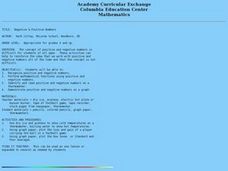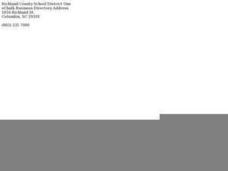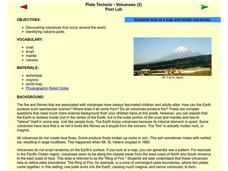Curated OER
Mixing Colors with Corn Syrup and Food Coloring
Anyone who has worked with small children know that color identification and color mixing can be fun! This simple idea has a lot of potential. It suggests to mix food coloring with corn syrup to provide an opportunity for color mixing...
Curated OER
Ionic bonding
Students explore ionic bonding. They draw examples of ionic bonding and explain the activities of the electrons of the elements. Students use paper plates and candy to draw electron configurations of given atoms.
Curated OER
Negative and Positive Numbers
Help scholars explain the concept of positive and negative numbers. Here you will find three separate activities that will help them to correlate positive and negative numbers with real life. Note: Activities require that the teacher...
Education World
Greater Than or Less Than With "Mr. Great"
Those tricky symbols for greater than and less than have stumped young mathematicians for generations. Mr. Great is a paper plate cut into a Pac-Man shape that can be used to keep track of which direction the symbols should face. This...
Curated OER
Multiplying Microbes
Ninth graders investigate the techniques of culturing bacteria. They culture bacteria using agar plates. Students identify and describe some environmental conditions that effect bacteria growth.
Curated OER
Frogs Frogs Frogs
Young scholars view a disk on the continental movement and analyze the given data on fossils, rock types and climate zones. In this geology lesson plan students draw a diagram of the earths layers, take a quiz complete a PowerPoint...
Curated OER
It's Not Your Fault
Young scholars study the San Andreas Fault, calculate its movements, and compare the movements on both sides. In this earthquake lesson students use the Internet to track movement, and calculate movement using a spreadsheet.
Curated OER
Life Along the Ring of Fire
Students research geological forces that create the Ring of Fire and its effects on cultures. They write reports on how natural disasters influence societies.
Curated OER
Structure of the Earth
Sixth graders investigate earthquakes and volcanoes. They demonstrate fault lines with a folded piece of paper, conduct an erosion experiment, and construct a volcano using clay, baking soda and vinegar.
Curated OER
The Moving Continents from Pangaea to the Future
Eighth graders examine how the movements of the Earth contribute to fossil distribution. In this fossils lesson students make maps of the placement of the continents.
Curated OER
Volcanoes Word Search
In this earth science worksheet, students find the words that are associated with the concept of a volcano and the answers are found at the bottom of the page.
Curated OER
The Basics: Earth Science
Middle schoolers define terms and watch a segment from a film. In this scientific theory lesson students work in small groups and draft a theory that was discussed in the program.
Curated OER
What Causes Earthquakes?
In this earthquakes learning exercise, students will read information about how different myths and legends have been created to describe the cause of earthquakes. Students will use this information to complete 3 short answer questions.
Curated OER
Hand and Foot Wrapping Paper!
Students paint on butcher paper with finger paints. In this art lesson, students paint with their fingers and toes.
Curated OER
Sea Floor Spreading Demonstration
Students examine the Earth's boundaries, the ocean floor, and the types of plate boundaries. In this sea floor lesson students fill out worksheets on the ocean floor and observe a demonstration.
Curated OER
Changing Crust
For this changing crust worksheet, students use candy bars, licorice sticks and bubble gum to simulate the 3 types of forces that change the Earth's crust. These include compressional forces, tensional forces and transversal forces. The...
Curated OER
Plate Tectonic - Volcanoes Pre Lab
Second graders draw and compare parts of volcano. They investigate parts of a volcano and distinguish between magma and lava.
Curated OER
Plate Tectonic - Volcanoes Post Lab
Second graders discover volcanoes that occur around the world. They identifying volcano parts.
Curated OER
Rate Your Family's Plate
Students examine their family's eating habits. In this adult health lesson, students share what they think from the survey facts presented to them. They set a goal for their family's health.
Curated OER
Volcano!-Is That a Volcano on Your Plate?
Learners explore how and where volcanoes form. They also explore how the interactions between oceanic and continental crust create volcanoes and other mountains and earthquakes in a simulation activity using cardboard of two thicknesses.
Curated OER
Plate Tectonic - Volcanoes (1)
Students learn the different shapes of Volcanoes and discuss why volcanoes only have a few shapes.
Curated OER
Plate Tectonic - Volcanoes Post Lab
First graders draw an erupting volcano. They learn the components of an erupting volcano.
Curated OER
Explosive Ideas!
Students explore the layers of the Earth and the dynamic changes that they cause on Earth's surface. Volcanoes and earthquakes become the focus of the lesson plan as the Oregon State quarter and its Crater Lake images are linked to the...
Curated OER
Drifting Continents
Students, through teacher-led demonstration, explore the idea of continental drift. They complete a worksheet involving the calculation of continental drift over time.
Other popular searches
- Plate Tectonics
- Plate Boundaries
- Tectonic Plates
- Blood Platelets
- Plate Tectonics Activities
- Plate Tectonics Pangaea
- Paper Plate Skeleton
- Crustal Plates
- Plate Tectonic Demonstration
- Science Plate Tectonics
- Lessons on Plate Tectonics
- Theory of Plate Tectonics

























